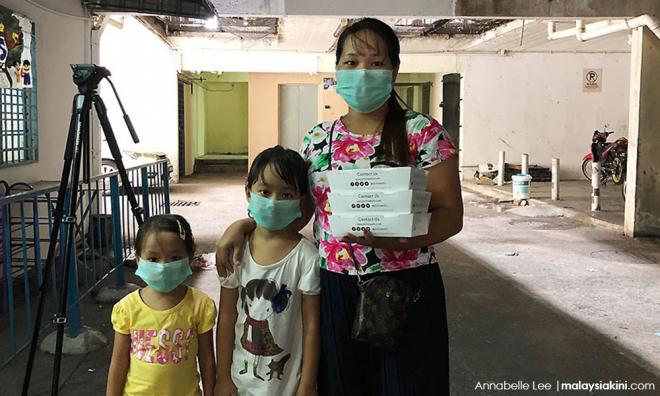
The standard response to this headline is probably going to be one of dismissal and derision - "people are dying you know, this isn’t the time to quibble about language or gender". But if now is not a good time, then when?
The language we use is only part of how we communicate. Language speaks to mindset, the words we choose reflect how we think and what we do. The language used by politicians and policymakers is an indicator of the policies they will likely make which affect us all. This is not about criticising - the decision to impose the movement control order (MCO) was not one which was made lightly. It is new and uncharted territory for governments around the world, and it is not the point of this article to point out the missteps.
So, let’s take a look at the official language of this MCO thus far. The initial announcement on March 16 was gender-neutral in many respects. The Prime Minister referred to us as saudara-saudari (friends) speaking to us as equals in this endeavour to keep the country safe but on March 18, the language became dangerously gendered.
"Selama tempoh dua minggu ini, saudara-saudari dan anak-anak hanya perlu berada di rumah. Just stay at home. Luangkan masa bersama anak, isteri dan ahli keluarga. Tidak perlu keluar ke mana-mana." (In this two weeks, everyone and their children only need to be at home. Just stay home. Spend time with your children, wife and family. There's no need to go out.)
The PM was speaking specifically to men, to stay home with their wives and children. In that one sentence, the authorities put the onus on men to keep their families safe. In that one sentence, all Malaysians were reduced to the nuclear "happy family" where the man leads and everyone obediently follows.

To impose this reality in a time of crisis is farcical at best. At its worst, it’s dangerous because it reinforces stereotypes about the gendered roles that we should be playing, whether or not this reflects the reality of our lives.
Tolstoy wrote "Happy families are all alike; every unhappy family is unhappy in its own way." There are many unhappy families in Malaysia. We have a divorce rate of about 25 percent. According to the Women’s Aid Organisation, an average of more than 5,000 cases of domestic violence and 300 cases of incest are reported a year to the police. To put that in perspective that’s about one reported case a day.
NGOs around the country are bracing themselves for an increase in domestic violence cases after the lockdown. There is a genuine concern about getting help or providing rescue services to those at risk with the CMO in force. The government’s Talian Kasih helpline for children and victims of domestic violence is reported to have seen a 57 percent increase in calls so far. This is not surprising given that families are forced to remain in close proximity in situations where stress levels are rising as there is real fear about making ends meet and job security.
On March 21, Works Minister Fadillah Yusof was widely reported to have said at a press briefing and press conference: "Policy-wise, under the order, only one person, which is the head of the family, should be allowed to go out to get daily essentials or medicine. That is the basic guideline. However, let’s say that there is a need to bring another person, then the family head must be able to explain (why) to the police. The police will then use their discretion."
Social media has exploded with helpful guides to aid male “heads of family” to distinguish kacang botol (four-angled beans) from kacang panjang (long beans), and daun sup (parsley) from ketumbar (coriander).
“Joke” WhatsApp messages were in abundance, with single women allegedly texting married women to ask if they can “borrow” their husbands as temporary “heads of household”.
After a while, these are no longer funny. They only speak to the grave disservice we seem to have done our men and boys by making them incapable of managing basic household purchases, though this too is playing to a gender stereotype. Maybe when this is over we should look into instituting home science as a compulsory subject for all.
Women are also reporting on social media that they have been stopped by the police and asked if they are in fact the "heads of their households". The gendered, patriarchal mindset of our leaders has rendered invisible thousands of women raising families on their own. Having made them invisible the question then arises of what policies and programmes are going to be made to cater to them to dig themselves out of the economic sinkhole that we are all pretending is not yawning beneath us.
On March 25, the PM observed: “Ibu-ibu pun, kerana ada banyak masa di rumah, mencuba pelbagai resipi masakan baharu untuk hidangan seisi keluarga. Tak kurang juga para bapa yang menggunakan peluang duduk di rumah untuk bersolat jemaah dengan isteri dan anak-anak.” (Mothers, because they have a lot of time at home, can try new recipes for their families. Fathers can use their time at home to lead their wife and children in prayers.)
Language like this sends a message that these are the acceptable delineated roles within the family. Women should continue to cook because what else should women with lots of time on their hands do? As for the men… well, now that we’ve established they can’t be relied on to distinguish dishwashing liquid from shampoo would you really trust them with a mop? Jokes aside, the reality is far more complex.
According to the Department of Statistics Malaysia (DOSM), in the fourth quarter of 2019, Malaysia’s labour force comprised 60.8 percent men and 39.2 percent women. Malaysian women drop out of the labour force in their late 20s to early 30s. It is well documented that women who leave the workforce in Malaysia do not return. This leaves them financially dependent with little or no access to ready cash, savings or the ability to fend for themselves in old age.

The 2018 Malaysian Labour Force Survey shows that 60.2 percent of women who are not officially employed cite housework, including child and elderly care, as the main reason for not seeking work. Housework, which includes family responsibilities, is also a common problem raised by women in the current workforce that prevents them from taking heavier responsibilities or leadership roles in the workplace.
In 2012, DOSM recorded incidents of poverty amongst female-headed households in Malaysia is 56 percent higher than that of male-headed households. The same proportions hold true for the hard-core poor.
The PM has just announced his latest package of grants and subsidies to the nation. He has pledged that no one will be left behind and even Makcik Kiah, the pisang goreng (banana fritters) seller, will have something to smile about.
This presupposes that Makcik Kiah and her family are in a position to easily access information and make claims to get the benefit of these subsidies. It presupposes that Makcik Kiah and her family have money in EPF to withdraw funds to tide them over the next few months. It presupposes that Makcik Kiah will be in a position to not just apply for the allocated micro-loans but also take a break from running her business and her duties at home to go for the entrepreneurship training programmes being made available.
The lack of infrastructure and programmes that specifically help women with issues like childcare, while placing the burden of caring on them, may well make this impossible.
Women will continue to be held back as long as gender stereotypes are perpetuated by policymakers. This crisis would have been an ideal opportunity to break free of the notion that women are dependents rather than people in their own right. As long as policymakers continue to speak and think in gendered language, women will continue to be disadvantaged.
SHEENA GURBAKHASH is a writer and communications specialist. - Mkini




No comments:
Post a Comment
Note: Only a member of this blog may post a comment.